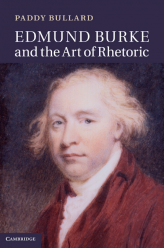Université Paris-Sorbonne(Paris-IV) Agence Nationale de la Recherche
Edmund Burke and the Art of Rhetoric
par Paddy Bullard
Hardcover : 284 pages
Editeur: Cambridge University Press
Langue: Anglais
Date: Avril 2011
ISBN: 9781107006577
Format: 228 x 152 mm
Presentation
Edmund Burke ranks among the most accomplished orators ever to debate in the British Parliament. But often his eloquence has been seen to compromise his achievements as a political thinker. In the first full-length account of Burke's rhetoric, Bullard argues that Burke's ideas about civil society, and particularly about the process of political deliberation, are, for better or worse, shaped by the expressiveness of his language. Above all, Burke's eloquence is designed to express ethos or character. This rhetorical imperative is itself informed by Burke's argument that the competency of every political system can be judged by the ethical knowledge that the governors have of both the people that they govern and of themselves. Bullard finds the intellectual roots of Burke's 'rhetoric of character' in early modern moral and aesthetic philosophy, and traces its development through Burke's parliamentary career to its culmination in his masterpiece, Reflections on the Revolution in France.
Features
• Will appeal to readers with a technical or historical interest in rhetoric, as well as to Burke specialists
• Offers new readings of Burke's best-known texts, the Philosophical Enquiry and the Reflections
• Places Burke's writing for the first time in its intellectual contexts: emerging discourses of moral psychology and Irish debates about civic eloquence
Table of Contents
Introduction: Burke, rhetoric and ethics
1. The ethical turn in early modern rhetoric, 1600–1760
2. Rhetoric in Ireland, 1693–1765
3. The Epicurean aesthetics of Burke's Philosophical Enquiry
4. Episodes in the evolution of Burke's eloquence
5. Reflections on the Revolution in France and the rhetoric of character
6. Burke, Rousseau and the purchase of eloquence
Conclusion
Bibliography
Index.

